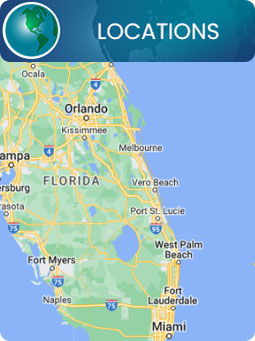Intercostal Nerve Block Specialist Q&A
An intercostal nerve block is a pain-relieving injection of an anesthetic, or often steroids, into the intercostal nerve. It is simple to execute and effective for managing pain. If you have chronic pain in your chest, chest wall, or upper abdomen, you may benefit from an intercostal nerve block. Consult our specialists at Global Neuro and Spine Institute if you are concerned about getting an intercostal nerve block injection. For more information, contact us or schedule an appointment online. We have convenient locations to serve you in Orlando FL, Jensen Beach FL, Malabar Palm Bay FL, Atlantis FL, Fort Pierce FL, Winter Park FL and Plantation, FL.


Table of Contents:
What is used for an intercostal nerve block?
Where do you inject intercostal nerve blocks?
How is an intercostal nerve block performed?
How long do intercostal nerve blocks last?
How often can you get an intercostal nerve block?
The intercostal nerve, between the ribs in the upper back, can undergo irritation or inflammation due to various factors. An intercostal nerve block serves both therapeutic and diagnostic purposes. This procedure proves effective in managing acute and chronic chest pain.
By administering an intercostal nerve block, inflammation can be mitigated, facilitating the healing process of the nerves. Intercostal nerve blocks are particularly beneficial for alleviating pain linked to shingles, rib fractures, and postherpetic neuralgia. To perform an intercostal nerve block, an injection comprising an anesthetic and often steroids is utilized to address both inflammation and pain. The effects of the administered steroid may take up to 10 days to become evident.
These blocks are introduced through the ribs within the thoracic region. Typically, this procedure is conducted during chest or abdominal surgeries, but it is also utilized as an outpatient treatment for acute pain. The intercostal nerves reside beneath each rib.
Should any of these nerves or the surrounding tissue become inflamed or irritated, it can result in pain. The application of a nerve block aids in diminishing inflammation and relieving discomfort. Responsible for transmitting pain signals from muscles, bones, and skin to the brain, the intercostal nerve plays a vital role. By selectively blocking specific segments of this nerve, medical professionals can diagnose the pain’s origin and impede its further transmission.
The actual block procedure is brief, typically lasting only a few minutes. To initiate the process, your healthcare provider will administer a local anesthetic via injection to numb the designated area for the nerve block. While you might still experience a slight pinch or some discomfort as the needle punctures your skin, the anesthetic will help alleviate any significant pain.
The patient is positioned either on their side or back, and the physician proceeds to deliver the injection targeting the intercostal nerves. To ensure pinpoint accuracy, imaging guidance such as ultrasound or fluoroscopy might be utilized to precisely locate the injection site. Following this, the medication is injected as closely as possible to the affected nerve. Following the injection, a period of rest lasting 15 to 30 minutes is advised to allow the medication to take effect. During this time, a nurse will be present to monitor you and ensure that no unexpected side effects arise.
Responses to intercostal nerve blocks can vary among patients. Typically, the steroid component starts to take effect within a span of three to five days and can offer relief for a duration that ranges from several weeks to several months.
Those dealing with persistent pain in the chest, chest wall, or upper abdomen might be considered suitable candidates for this procedure. Generally, intercostal nerve blocks produce temporary pain relief and are successful in many cases. However, some individuals may not experience any discernible effects from the block and could require alternative treatments to address their symptoms. The experienced team at Global Neuro & Spine Institute collaborates closely with patients to determine the appropriateness of this treatment approach.
The number of injections you might receive during your intercostal nerve block procedure and the potential for repetition depend on the extent and duration of pain relief achieved. In situations where the initial injection proves effective, but the pain resurfaces, you might be considered for additional injections, especially if the pain relief was sustained for a reasonable period.
The experts at Global Neuro & Spine Institute carefully track patient responses to intercostal nerve blocks and create individualized treatment plans that align with their specific needs.
Intercostal nerve blocks are fast-acting treatments that help patients experience up to months of pain relief. Those dealing with persistent pain in the chest, chest wall, or upper abdomen might be considered suitable candidates for this procedure. Intercostal nerve blocks are available at Global Neuro & Spine Institute. For more information, please contact us or schedule an appointment online. We serve patients from Orlando FL, Conway FL, Edgewood FL, Jensen Beach FL, Ocean Breeze FL, Rio FL, Malabar Palm Bay FL, Melbourne FL, Atlantis FL, Palm Springs FL, Boynton Beach FL, Fort Pierce FL, White City FL, St Lucie FL, Plantation FL, Pine Island Ridge FL, Lauderhill FL, Winter Park FL, Bertha FL, Alafaya FL and surrounding areas. We also encourage our patients to visit us online to learn more about our locations and directions to our clinics.

CONDITIONS WE TREATED:
- Facet Joint Disorders
- Back Surgery Complications
- Migraines
- Herniated Discs
- Back Pain
- Lower Back Pain
- Neck Pain
- Sciatica Pain
- Abdominal Pain
- Compression Fractures
- Joint Pain Treatments
- Shoulder Pain Treatments
- Elbow Pain Treatments
- Hip Pain Treatments
- Knee Pain Treatments
- Diabetic Peripheral Neuropathy
- Complex Regional Pain Syndrome
- Pelvic Pain
- Occipital Neuralgia
- Chest Wall Pain
- Chronic Facial Pain
- Phantom Limb Pain
- Interstitial Cystitis – Pelvic Pain
- Herpetic Neuralgia
- Cervical Radiculopathy
- Degenerative Disc Disease
ADDITIONAL SERVICES
- Kyphoplasty
- Epidural Steroid Injection
- Posterior Facet Blocks – Rhizotomy
- Sacroiliac Joint Injection
- Percutaneous Discectomy
- Stellate Ganglion Blocks
- Intercostal Nerve Blocks
- Intra-Articular Peripheral Joint Injection
- Lumbar Epidural Steroid Injections
- Coccygeal Nerve Block
- Occipital Nerve Blocks / Rhizotomy
- Selective Nerve Root Blocks
- Discography
- Hardware Blocks
- Cluneal Nerve Block
- Spinal Cord Stimulators
- Sympathetic Nerve Blocks
- Headaches Treatments

CONDITIONS WE TREATED:
- Facet Joint Disorders
- Back Surgery Complications
- Migraines
- Herniated Discs
- Back Pain
- Lower Back Pain
- Neck Pain
- Sciatica Pain
- Abdominal Pain
- Compression Fractures
- Joint Pain Treatments
- Shoulder Pain Treatments
- Elbow Pain Treatments
- Hip Pain Treatments
- Knee Pain Treatments
- Diabetic Peripheral Neuropathy
- Complex Regional Pain Syndrome
- Pelvic Pain
- Occipital Neuralgia
- Chest Wall Pain
- Chronic Facial Pain
- Phantom Limb Pain
- Interstitial Cystitis – Pelvic Pain
- Herpetic Neuralgia
- Cervical Radiculopathy
- Degenerative Disc Disease
ADDITIONAL SERVICES
- Kyphoplasty
- Epidural Steroid Injection
- Posterior Facet Blocks – Rhizotomy
- Sacroiliac Joint Injection
- Percutaneous Discectomy
- Stellate Ganglion Blocks
- Intercostal Nerve Blocks
- Intra-Articular Peripheral Joint Injection
- Lumbar Epidural Steroid Injections
- Coccygeal Nerve Block
- Occipital Nerve Blocks / Rhizotomy
- Selective Nerve Root Blocks
- Discography
- Hardware Blocks
- Cluneal Nerve Block
- Spinal Cord Stimulators
- Sympathetic Nerve Blocks
- Headaches Treatments






